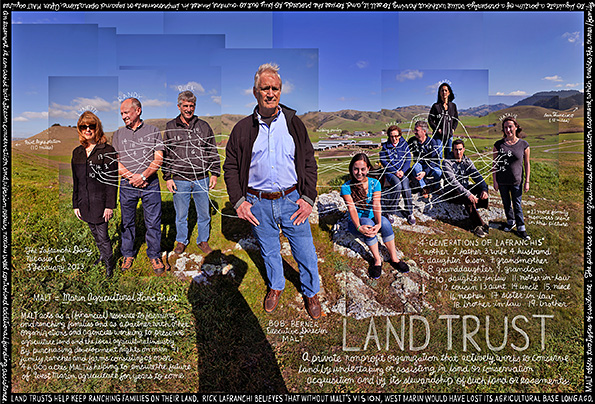
#LandTrusts protect farmland to allow an ethical and reliable food system room to grow. @deliciousliving #foodlist
Land Trust: A resilient food future starts in the dirt. But in America today, we’re losing about an acre of farmland every minute—pavement, strip malls and freeways grow in place of corn, tomatoes and cows.
Land trusts like Marin Agricultural Land Trust stand in opposition to careless growth by permanently protecting the land’s natural character and resources. In the United States, land trusts have saved 37 million acres of farmland, habitat, parks, historical sites and affordable housing. Land trusts protect the land forever, making sure that an ethical and reliable food system has room to grow.
Title: Land Trust
Location: The LaFranchi Dairy, Nicasio, CA
Featuring: Four Generations of LaFranchis, and Bob Berner of MALT
Bob recognizes the value of preserving the undeveloped open space and agricultural traditions in a community. He directs Marin Agricultural Land Trust (MALT), which acts as a financial resource to local farming and ranching families, and as a partner with other organizations and agencies working to preserve agricultural land and local agricultural industry.
As Bob explains: “A land trust is a private nonprofit organization that actively works to conserve land by undertaking or assisting in land or conservation acquisition, and by its stewardship of such land or easements.”
Land trusts help keep ranching families on their land. Rock LaFranchi believes that without MALT’s vision, West Marin would have lost its agricultural base long ago. MALT offers two types of assistance: (1) the purchase of agricultural conservation easement, which enables the owner/family to liquidate a portion of a property’s value without having to sell it, and (2) using the proceeds to buy out co-owners, invest in improvements, or expand operations. After MALT acquires an easement, it can assist with stream conservation, riparian repairs, noxious weed control, and additional funding assistance.
Short film: "Land Trust" by Know Your Food
In some parts of the country, a farm is worth more for its real estate than for what it grows. And as profitability become increasingly illusive, some farmers look to sell off their land. Bob Berner explains how land trusts provide guidance and economic support in the form of conservation easements to keep farms in production and provide community with cultural continuity.
Story Bank: Saving the places you love
Have you ever returned to a favorite trail or meadow or blueberry patch from earlier times to find it exactly as you remember it? This may very well be because the area is protected under a conservation easement. Walter Clark, the Executive Director of the Blue Ridge Conservancy, shares with us the value of conservation easements and their role in preserving a blueberry patch in Lansing, North Carolina with deep cultural heritage.
 Douglas Gayeton: How was it that your land came under conservation easement?
Douglas Gayeton: How was it that your land came under conservation easement?
Walter Clark: My partner, Johnny Burelson, and I bought this farm in 2003. We came to the farm two or three years earlier to pick blueberries ourselves and fell in love with it. We thought that was one of the most beautiful places we’ve ever seen, and two years later, we were back in the area and saw that it was for sale. Being city boys and not really knowing a lot about farming, we were more intrigued with the old historic, 1880s farmhouse that was there.
But we bought the farm and quickly realized that this farm was a part of the community, that this blueberry business was a hub for the local community in Ashe County. And it was a responsibility in some ways to continue it. We quickly learned about blueberries, how to raise them, continued with the staff that kept the operation going. It truly is a hub of the community and part of the cultural heritage of the county.
Douglas Gayeton: When you look at your work with your conservancy, do you have goals of what you would like to do to help shape the local environment in terms of agriculture and opens space?
Walter Clark: Yes, our goals are fairly locally specific. We have large tracks of land that are protected in their more pure state, but then around those fully protected lands I would like to see the agricultural lands, that are a big part of this area, continue to be protected and enhanced. It really is an interesting place to live because people come to this corner of North Carolina because of its scenic beauty, because of the mountains and also because they enjoy the pastoral nature of farms and culture. That’s a very rich history from a cultural perspective, and without that people would not come here. It’s important to protect it, to enhance it, but also to not make it a sort of museum or a showcase just for people to look at it. It has to be working land. We protect conservation values, but we want people to use those lands in a productive and sustainable way.

Is there a piece of farmland in your community that's protected by a land trust (or should be)?
For the past three years, the Lexicon of Sustainability has sought out the foremost practitioners of sustainability in food and farming to gain their insights and experiences on this important subject. What began as a photography project to spread their knowledge has grown to include short films, study guides, traveling shows, a book, and a website where people can add their own terms to this ever-evolving lexicon. See more at www.lexiconofsustainability.com.
